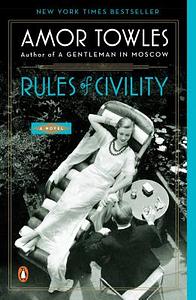Take a photo of a barcode or cover
hopeful
reflective
medium-paced
Plot or Character Driven:
Character
Strong character development:
Yes
Loveable characters:
Complicated
Diverse cast of characters:
Complicated
funny
fast-paced
emotional
reflective
medium-paced
Plot or Character Driven:
Character
Strong character development:
Complicated
Loveable characters:
Complicated
Diverse cast of characters:
No
Flaws of characters a main focus:
Yes
adventurous
reflective
medium-paced
Plot or Character Driven:
Character
Strong character development:
Yes
Loveable characters:
Yes
Diverse cast of characters:
No
Flaws of characters a main focus:
Complicated
The story here was fine but the real reason for four stars was that I just loved Kate/Katey/Katya/Miss Kontent. She was a real breath of fresh air!
adventurous
lighthearted
fast-paced
Plot or Character Driven:
A mix
Strong character development:
No
Loveable characters:
Complicated
Diverse cast of characters:
No
Flaws of characters a main focus:
No
The writing style of this book was both comical and eccentric and its characters enjoyable. Nevertheless none of the characters, whilst interesting, were as convincing or as lovable as those in Amor Towels other book, ‘A Gentleman in Moscow’. Similarly while the historical backdrop of 1930s New York was entertaining, it didn’t have the same thrilling importance that Moscow had in his other novel. That being said I enjoyed that this book was less predictable than I initially thought it would be, the plot moves around enough to keep you engaged but perhaps at the cost of any really in depth studies of relationships between the protagonist and other characters. In the first quarter of the novel it seems like we are building up to understand the main character’s seemingly complex with her roommate and friend Eve, but after so many anecdotes and building, this relationship drops off without much follow up or reflection which was a little frustrating. Finally, while I love a story led by a sardonic and driven independent woman, some of Katey’s life experiences as a young single working (non upper class) woman feel pretty out of step with reality (the lack of condescending sexism from anyone in her life). Overall I would say if you enjoy a light read set in 30s New York this is still a fun (holiday?) read.
I desperately wanted to love this book. Amor Towles is one of my favorite authors, and I have loved Gentleman in Moscow and The Lincoln Highway both very dearly. But this book…I just couldn’t enjoy it at all.
Unfortunately, a lot of reviews made a point that I think stands: Towles decided to write from the perspective of a young woman in the 1930s even though he is an adult man writing in the 2000s/2010s. There were many instances of Katey being aware of things that women just don’t care about, like Alley’s (I think it was Alley’s) chest size or the color of Peaches’ aerolas.
One reviewer said that the characters suffered from a lack of personality, and as much as it pains me to say, I think that’s the most accurate assessment of the characters in the book. I don’t really know anything about the characters except what was told to us. I genuinely forgot Katey was a bookworm. I vaguely remembered she was Russian. There was just no personality to her or to any of the characters. I was never surprised by what any of them did, and it reached a point where I could not identify anyone’s voice. Thankfully, Towles has greatly improved in his writing, and his other two novels have escaped this.
On another note, the novel seemed to forget that it was set in the 1930s. Yeah, I know there were wealthy people during the Great Depression, but hardly anyone was affected by it in this novel except in a telling fashion. This book was *really* (but not canonically) set in the 1920s, with all of the attitudes and spending of wealth. None of the restaurants or diners were hit by hard times. Katey didn’t go without eating, she quit her job in the midst of the Depression, and she immediately found a new one. There wasn’t even mention of bread lines or anything of the sort. It was a feminine version of The Great Gatsby, and I was never a fan of the original. The parts that weren’t Gatsby were The Sun Also Rises by Hemingway, and I do not mean that to be flattering. All of the characters seemed to be high-functioning alcoholics, and that’s all the plot seemed to be: finish drinking at this location, let’s go and drink at another. Ostentatious displays of wealth. Lavish parties. A loose woman who’s interested in the main male character. And then Katey just tripping her way into great wealth?
This novel, in my opinion, suffers from a lack of knowing the story. Based on the summary, I thought Tinker was going to play into the novel much more, but that wasn’t the case. He didn’t have that much time in the book. I had expected a story about her being his mistress and the story there, of a protagonist I didn’t agree with but still somehow liked. Instead, it was “oh this really rich guy was cute and single and I met his other rich friends and their rich friends.” The story didn’t know where to go. It lost itself. And with the reveal that Tinker went from riches to rags, I was expecting Katey to be at his side through the whole of it. Admittedly, I was incredibly disappointed when that didn’t happen.
This is certainly the worst of Amor Towles’ novels. Eight years passed between this book and Gentleman in Moscow, and the difference and improvement is astounding. Towles clearly grew as a writer, and he learned how to better write in the female voice (also learned not to rely on the female voice). While I don’t recommend this novel to anyone, I do suggest trying out Gentleman in Moscow or The Lincoln Highway if you want to read Towles’ work.
Unfortunately, a lot of reviews made a point that I think stands: Towles decided to write from the perspective of a young woman in the 1930s even though he is an adult man writing in the 2000s/2010s. There were many instances of Katey being aware of things that women just don’t care about, like Alley’s (I think it was Alley’s) chest size or the color of Peaches’ aerolas.
One reviewer said that the characters suffered from a lack of personality, and as much as it pains me to say, I think that’s the most accurate assessment of the characters in the book. I don’t really know anything about the characters except what was told to us. I genuinely forgot Katey was a bookworm. I vaguely remembered she was Russian. There was just no personality to her or to any of the characters. I was never surprised by what any of them did, and it reached a point where I could not identify anyone’s voice. Thankfully, Towles has greatly improved in his writing, and his other two novels have escaped this.
On another note, the novel seemed to forget that it was set in the 1930s. Yeah, I know there were wealthy people during the Great Depression, but hardly anyone was affected by it in this novel except in a telling fashion. This book was *really* (but not canonically) set in the 1920s, with all of the attitudes and spending of wealth. None of the restaurants or diners were hit by hard times. Katey didn’t go without eating, she quit her job in the midst of the Depression, and she immediately found a new one. There wasn’t even mention of bread lines or anything of the sort. It was a feminine version of The Great Gatsby, and I was never a fan of the original. The parts that weren’t Gatsby were The Sun Also Rises by Hemingway, and I do not mean that to be flattering. All of the characters seemed to be high-functioning alcoholics, and that’s all the plot seemed to be: finish drinking at this location, let’s go and drink at another. Ostentatious displays of wealth. Lavish parties. A loose woman who’s interested in the main male character. And then Katey just tripping her way into great wealth?
This novel, in my opinion, suffers from a lack of knowing the story. Based on the summary, I thought Tinker was going to play into the novel much more, but that wasn’t the case. He didn’t have that much time in the book. I had expected a story about her being his mistress and the story there, of a protagonist I didn’t agree with but still somehow liked. Instead, it was “oh this really rich guy was cute and single and I met his other rich friends and their rich friends.” The story didn’t know where to go. It lost itself. And with the reveal that Tinker went from riches to rags, I was expecting Katey to be at his side through the whole of it. Admittedly, I was incredibly disappointed when that didn’t happen.
This is certainly the worst of Amor Towles’ novels. Eight years passed between this book and Gentleman in Moscow, and the difference and improvement is astounding. Towles clearly grew as a writer, and he learned how to better write in the female voice (also learned not to rely on the female voice). While I don’t recommend this novel to anyone, I do suggest trying out Gentleman in Moscow or The Lincoln Highway if you want to read Towles’ work.
Oh, after a gentleman in Moscow, I really wanted to love this book but I just didn't. It was nice, but didn't leave me pondering existence. Maybe because I've never been to new york? The last 20 pages were the best.
It’s hard to like the main character. She seems driven in a very selfish way, but admittedly i found myself ever more curious of her “next”. The writing is engaging and approachable, but his next novel is considerably better.
I loved this book and was sad for it to end. A perfect pandemic read to be transported to jazz clubs and parties in 1938 New York City. Kate charmed me with her wits and temperament and I wished I could be her friend. A story of a dazzling year turned upside down, chooses we make, people we meet and the ripples of life to follow.




